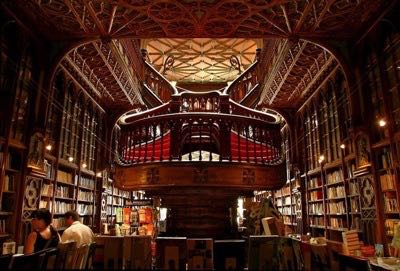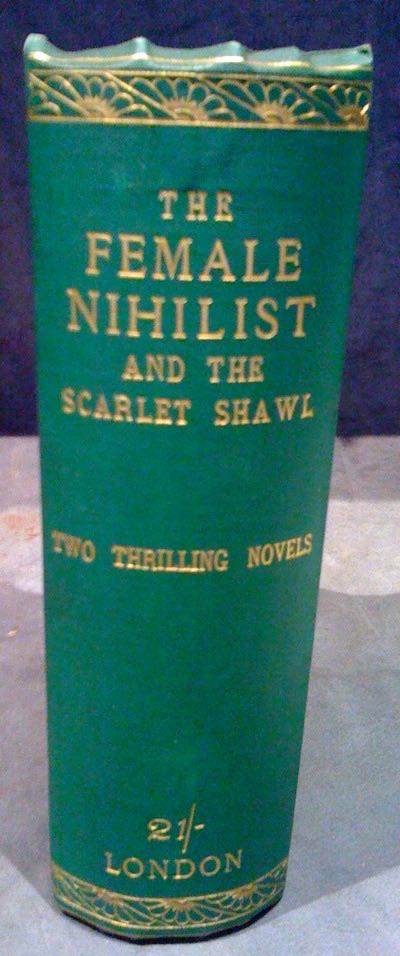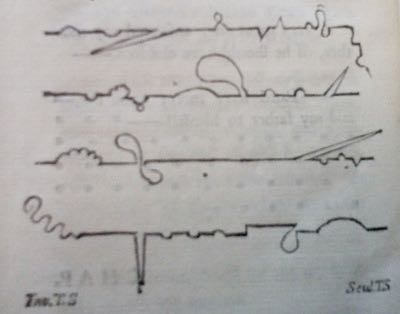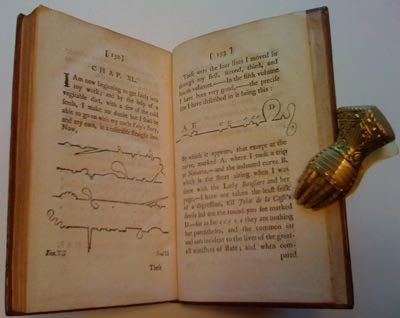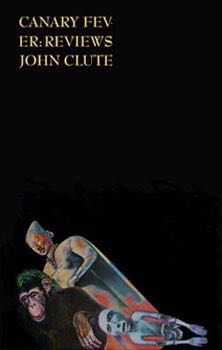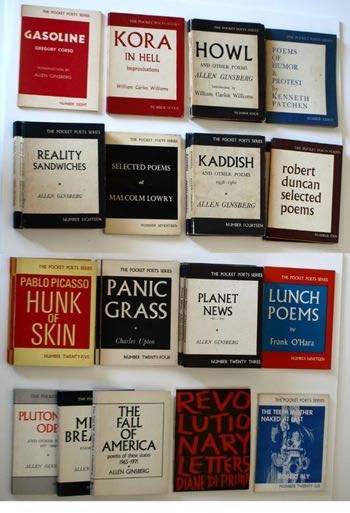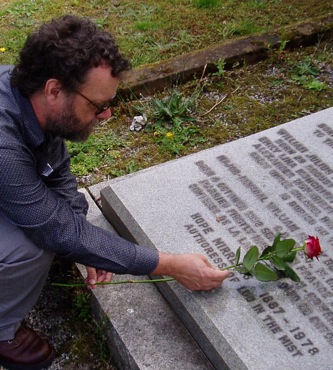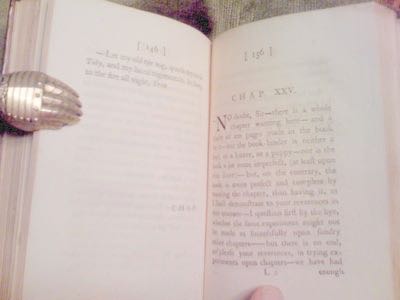
April to June 2009
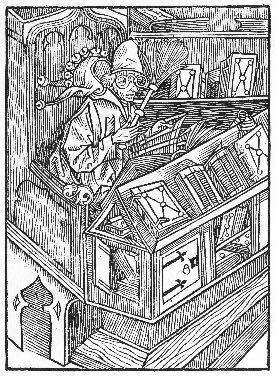
11-12 June 09
Hope-in-the-Mist : In the Bindery
Toiling in the Temporary Culture bindery : endsheets cut down, frontispieces
folded, slicing blanks ; cloth to cut, cases to make, books to sew,
frontispieces to insert ; fingerprints to ink (none genune without this
mark).
Back from London, familiar and unfamiliar terrain : lunch at 2 Veneti, ABA book fair at the Olympia, the Monmouth Coffee Shop in Covent Garden (Seven Dials), the Spread Eagle in Greenwich, Camden High Street, a secret library in Islington (photos below), Saf vegan restaurant in Shoreditch, a sunny day in the English countryside, coffee again, felafel in Portobello Road, and then off again.
Around the corner from a train station, opposite a housing estate, down an alley and through a gate, and then down a few steps to a solid door behind which lies a civilized labyrinth with carpets and chairs and the intertwined limbs and alphabets of a location-specific shelving arrangement :
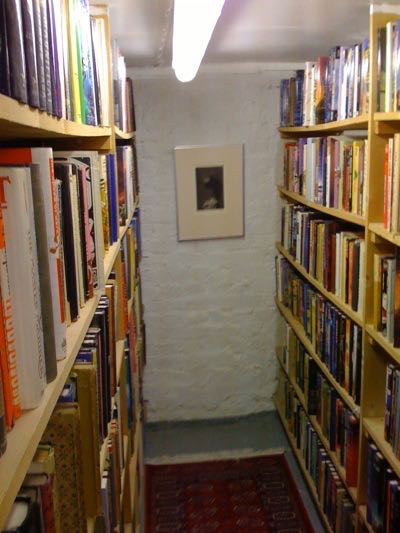
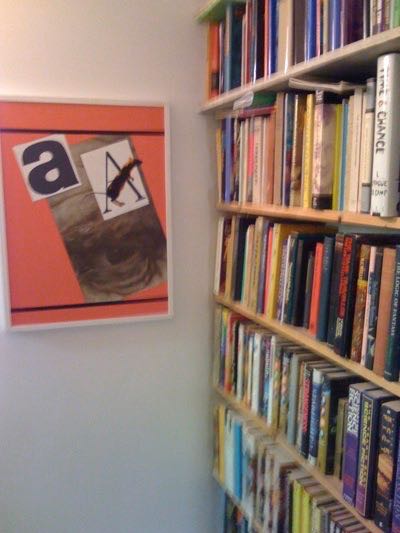
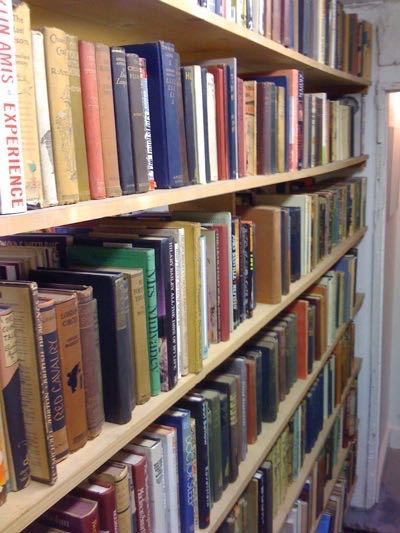
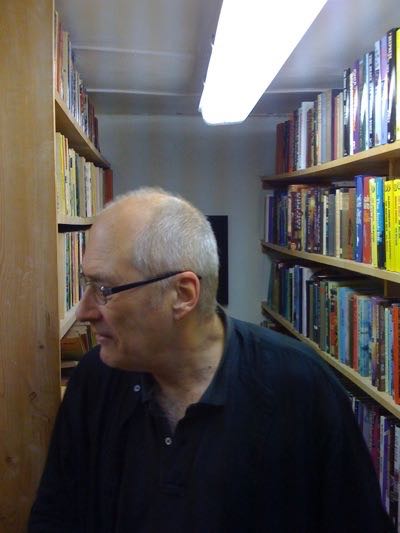
John Clute in his labyrinth. [Photo by Judith Clute]
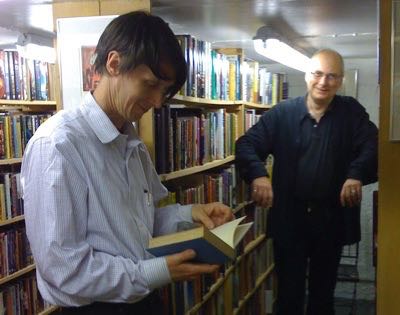
Henry Wessells and John Clute. [Photo by Judith Clute]
2 June 09
A familiar friend
A nice book landed briefly upon my desk before taking wing, the first edition
of a book whose contents are familiar in translation, and now in the original
(note the publisher’s logo) :

— Jorge Luis Borges. El Jardin de senderos que se bifurcan (Buenos Aires, Sur, [1942]). The opening passage of “ Tlön, Uqbar, Orbus Tertius ” is simple and enigmatic : “ Debo a la conjunción de un espejo y de una enciclopedia el descumbrimiento de Uqbar. ” The book is a classic, its contents are the core of what we define as Borgesian. It was a tasty pleasure to read the familiar stories in the original Spanish, a language I don’t quite know (when did that ever stop me ?).
1 June 09
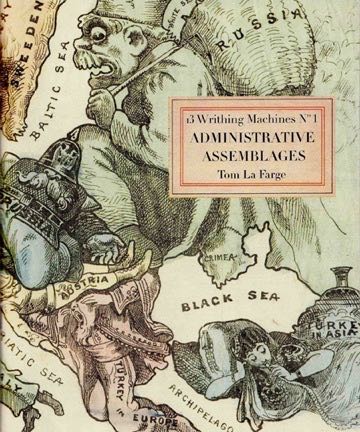
— Tom La Farge. Writhing Machines No. 1 : Administrative Assemblages (Brooklyn, Proteotypes, [2009]). Interesting and well-devised treatment of writing with inventive constraints : “ to say what you had not thought of saying in ways you would not have chosen to say it ” (which is a pretty good summation of the point of art for the artist). Modes include lists, memory arrangements, “ full disclosure ” (forms and other means of compelling responses), libraries of imaginary books, classifications, timelines (calendars, chronologies), maps and gazeteers, and more. With wide-ranging citations and examples, and “ writhing exercises ”, Administrative Assemblages is the first in a series of 13 pamphlets. Don’t wait, subscribe to the whole series.
— E.M. Forster. Virginia Woolf (New York, Harcourt Brace, [1942]). I happened to pick up this book again, and marvel anew at its concision and charm and insight into Woolf’s writings.
“ For it was not about something. It was something. ”
And again, on The Waves , “ The Waves is an extraordinary achievement . . . . It is trembling on the edge. A little less — and it would lose its poetry. A little more — and it would be over into the abyss, and be dull and arty. It is her greateast book. ”
“ . . . no savour whatever in any dish of Henry James’, but when Virginia Woolf mentions nice things they get right into our mouths, so far as the edibility of print permits. We taste their deliciousness. And when they are not nice, we taste them equally, our mouths awry now with laughter. ”
“she gave acute pleasure in new ways, she pushed the light of the English language a little further against darkness”
30 May 09
Occasional Notes :
— Hope-in-the-Mist is in press and the sheets of the hand-bound
edition are expected early next week. The midnight bindery of Temporary Culture
will be very busy.
— Your correspondent will be travelling to London next week and will file a report as conditions allow (in addition to twittering marginal glosses, compiled here).
— Little, Big :
I am informed that John Crowley is writing the alphabet in his fine calligraphic
hand and ornamenting the lettered copies of the illustrated edition of Little,
Big . We are patient, and we look forward to the publication
of the book. (Photograph here from
the last time I re-read the book.)
Current Reading :
— John Crowley. Four Freedoms (William Morrow, 2009). Just
picked this up.
— Colin Harrison. The Finder (2008 ; Picador paperback).
Recent Reading :
— Walter Kirn. Lost in the Meritocracy. The Undereducation of
an Overachiever (Doubleday, 2009). Kirn has a genuine and unflinching talent
for examining his life and write the larger relevance of a series of comic and
alarming incidents. It is his ability to be as severe upon himself as upon those
around him that redeems the fierceness of his critique. I read this with interest
as a whilom
member of “ the bitterly nonconformist Terrace Club, home to Princeton’s
proudest rejects . . . we (the wounded seventeen of us who ate
beneath its leaking roof and danced on its warped linoleum floors) . . . construed
the fact that the place conferred no status to mean that status didn’t
concern us, which made us rare individuals indeed. ” Chapter Twelve,
on the taxonomy of his fellow students, is hilarious and carefully observed.
— [Maria Edgeworth]. Castle Rackrent ; An Hibernian Tale. Taken from Facts, and from the Manners of the Irish Squires, before the Year 1782 (London, 1800, 2nd ed.). Novel that gave its name to the excesses of profligate or absentee landlords, and an absolute delight of indirect narration by ninety-year-old Thady Quirk : “ the authenticity of his story would have been more exposed to doubt, if it were not told in his own characteristic manner ” (preface). To read passages aloud is to hear the vernacular speech of Ireland accurately reported : a record of a regional — nonstandard — variety of the English tongue (complete with a glossary “ for the information of the ignorant English reader ”).
— Edwin Hirschmann. Robert Knight. Reforming Editor in Victorian India (New Delhi, Oxford Univ. Pr., 2009). Biography of the man who gave India “ an aggressively independent press, creating the Times of India , the pre-eminent paper of western India, and The Statesman , the pre-eminent paper of eastern India, and in so doing he helped to promote political awareness among the indigenous peoples ” (I quote from Hirschman’s entry on Knight in the ODNB as I have already lent my copy of the book). “ A former defender of imperialism, Knight came to believe that British rule had failed as a vehicle for Indian progress and the welfare of its people. In 1886 he supported the year-old Indian National Congress, writing that only the people themselves, and not even well-meaning foreigners, could understand and protect their interests ”.
— Nigel Slater. Toast. The Story of a Boy’s Hunger (2003 ; Gotham Books, 2004). Brilliant, touching, and with a deft comic gift : again and again, Slater recounts just slightly more than one needs to know, to reach the point of squirming and insight.
— John Clute. Canary Fever. Reviews (Beccon Publications, 2009). To read this compendium of recent reviews is to dive into the the stream of contemporary science fiction and fantasy and to hear the voice of a clear-headed, passionately well-read guide to the inferno : it is to hear the voice of John Clute.
Bookbinders, Autodidacts, Bookstores, Libraries
(with a small digression on the use of superlatives)
Benito Juárez, Bookbinder & President of
Mexico
An orphan, Benito Juárez was given a home and an education by “ an
honest bookbinder, one Antonio Salanueva ” (A Life of Benito
Juarez. Constitutional President of Mexico by U.R. Burke, London, 1894).
He became governor of Oaxaca and then president of Mexico. My colleague [AO]
travelled to Oaxaca, Mexico, not long ago, and took pictures of the bindery
in the Casa Benito Juárez :
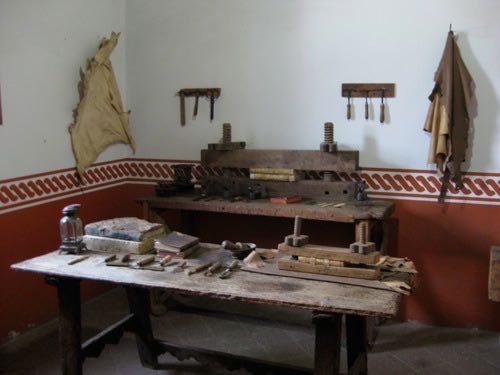

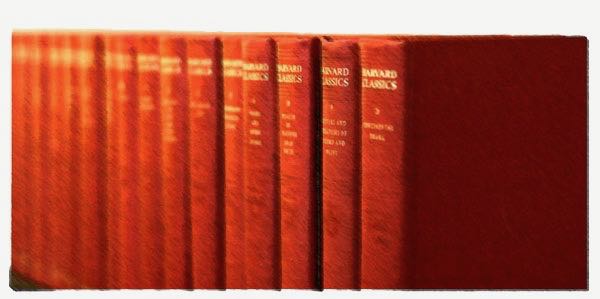
“ Dr. Eliot’s Five Foot Shelf ” (Harvard Classics)
http://www.thewholefivefeet.com/home.html
Quiz and essays from Christopher R. Beha, author of the memoir, The Whole
Five Feet (Grove Press) [thanks to JC].
Interesting
Bookstores :
http://www.miragebookmark.ch/most-interesting-bookstores.htm
The same website has a link for Interesting
Libraries :
http://www.miragebookmark.ch/most-interesting-libraries.htm
A brief digression on use of superlatives. The reader will notice that in the last two entries I have dropped the superlative that appears the website’s own titles ; overuse a word, and it becomes meaningless. My comment on the library of the Brooklyn Historical Society (24 April, below) is a rare occurence.
A post on recent reading will follow shortly.
30 April 09
Two sentences :
. . . He disliked the way they seemed to him to use literature as an insulation against life rather than an intensification of it.
He liked books but they were to him a kind of psychic food that should convert to energy for living.
William McIlvanney
The Papers of Tony Veitch (1983; Pantheon Books paperback, [1984])
26 April 09
How to write a classic :
“ a nonlinear set of writings jotted down on a loose heap of leftover
government stationery . . . it had no press, no publisher, no editor,
no distributor, and it was never for sale. Its user base — in total, maybe
200 women — probably never read it. Instead, they heard the work recited
aloud by someone crouching near a lantern after dark . . . the work
was copied by hand and circulated within a small royal clique ; third, it
was written in a special cursive script used only by women. It was girl talk
no man could overhear. ”
— Bruce Sterling on The Pillow Book of Sei Shonagan
24 April 09
The most beautiful room in New York City
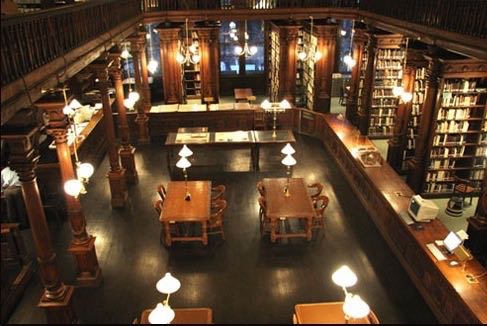
The newly renovated library of the Brooklyn Historical Society (this photograph doesn’t do the space justice), where I went to the publication party for The Social Vision of Alfred T. White , edited by Wendy Walker (Proteotypes, 2009). Alfred Tredway White (1846–1921) was a philanthropist who lived at the edge of the abyss — he could walk from his fine house down the cliff to the waterfront slums of nineteenth-centry Brooklyn — who worked to build safe, clean housing for ordinary working people and to encourage other wealthy people to create similar projects throughout New York City.
22 April 09
Brilliant remainder binding, 1880 : Two Thrilling Novels !
21 April 09
Current reading :
[Laurence Sterne]. The Life and Opinions of Tristram Shandy, Gentleman ,
1760-7. At the end of volume VI is this wonderful picture of the author’s
narrative method ! As meandering and digressive as anything by Avram
Davidson or [ insert the name of your favorite up-to-date postmodernist
here ].
17 April 09
Newly published by Beccon Publications : Canary
Fever. Reviews by
John Clute
I have just ordered my copy.
Recent Reading :
— Selected Poems of Malcolm Lowry . Edited
by Earle Birney with the assistance of Marjorie Lowry. City Lights,
Pocket Poets Series Number Seventeen, [1962].
From “ He Liked the Dead ” :
He seemed to have known no love, to have valued dread
above all human feelings. He liked the dead.
The grass was not green not even grass to him ;
nor was sun, sun ; rose, rose ; smoke, smoke ; limb, limb.
And from “ After the Publication of Under the Volcano ” :
Fame like a drunkard consumes the house of the soul
Exposing that you have worked for only this —
Ah, that I had never suffered this treacherous kiss,
And had been left in darkness forever to founder and fail.
And one more, from “ Thoughts while Drowning ” :
the tourists wait with fatuous smile of triumph
with bereaved arms upon the gossiping shore
having known the corpse they are for a moment great.
10 April 09
Announcing a new book from Temporary Culture :
HOPE-IN-THE-MIST
The Extraordinary Career & Mysterious Life
of
Hope Mirrlees
by
Michael Swanwick
Hope-in-the-Mist is the first book-length
study of British author HOPE MIRRLEES, whom Virginia Woolf described
as “her own heroine — capricious, exacting, exquisite,
very learned, and beautifully dressed.” Raised in Scotland and
Zululand, Mirrlees studied with the great classical scholar Jane Harrison
and later lived with her in Paris and London. Mirrlees wrote one major
poem, Paris (1920), the missing link between French avant-garde
poetry and her friend T. S. Eliot’s The Waste Land (1922);
her novel Lud-in-the-Mist is an acknowledged classic of fantastical
literature.
Forthcoming 10 July 2009 from Temporary Culture. Details at :
http://www.avramdavidson.org/hope-in-the-mist.html
Current reading :
[Laurence Sterne]. The Life and Opinions of Tristram Shandy, Gentleman ,
1760-7, in the original nine volumes : one by one, chiefly on the train
( ! ). How could I have put off this joy for so long? the wellspring
of meander & digression & indirection & it’s just plain
fun. This is a book that demonstrates Avram Davidson and postmodernism — simultaneously.
I:163 “Digressions, incontestably, are the sunshine;——they
are the life, the soul of reading”
II:12 On Locke’s Essay concerning Humane Understanding (and Tristram
Shandy itself) : “It is a history-book [. . .]
of what passes in a man’s own mind”
IV:106-7 “instead of advancing, as a common writer, in my work with
what I have been doing at it—on the contrary, I am thrown just so many
volumes back ...”
IV:109 “As for the propagation of Geese [. . .] I shall never
want tools to work with.”
And IV:146 (L1v) - 156 (L2r) provides as concrete an example of descriptive bibliography in action as one will ever find :
—No doubt, Sir,—there is a whole chapter wanting here—and a chasm of ten pages made in the book by it—but the book-binder is neither a fool, or a knave, or a puppy—nor is the book a jot more imperfect (at least upon that score)— but, on the contrary, the book is more perfect and complete by wanting the chapter, than having it, as I shall demonstrate [. . .]
Signature mark L on page 145 is followed by L2 on
page “156” — no missing page : “the
book-binder is neither a fool,
or a knave, or a puppy—nor is the book a jot more imperfect (at least upon
that score)— but, on the contrary, the book is more perfect and complete
by wanting the chapter, than having it” — and for the rest of the
volume, odd numbers continue on the left-hand pages and even numbers on the right-hand
pages.
Ho-hum, the uninitiated may say, but here is the author playing with the
very medium of the printed book. There are other playful moments that are
entwined with the hand-printed and hand-made book : in vol. I, both
sides of a leaf are entirely printed in black (after the discussion of the
death of Yorick ; and in vol. III there is a leaf of paper, marbled
on both sides, to manifest the reader’s utter reliance upon the author
to find meaning in the book.
1 April 09
Mandrakes, again :
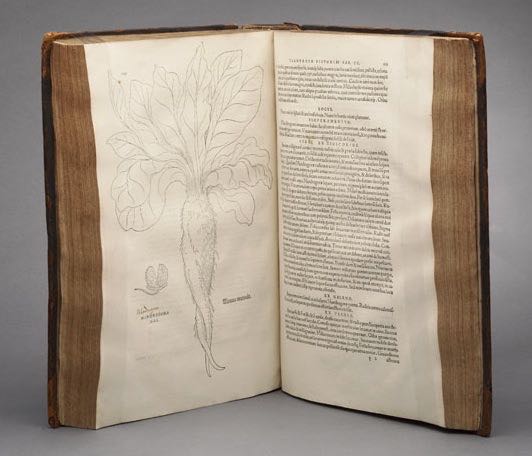
The earlier Mandrake post, here.
This creaking and constantly evolving website of the endless bookshelf : I expect that some entries will be brief, others will take the form of more elaborate essays, and eventually I will become adept at incorporating photos or comments and interactivity. Right now you’ll have to send links to me, dear readers. [HW]
electronym : wessells
at aol dot com
Copyright © 2009
Henry
Wessells and individual contributors.
Produced by Temporary
Culture, P.O.B. 43072, Upper Montclair, NJ 07043 USA.
